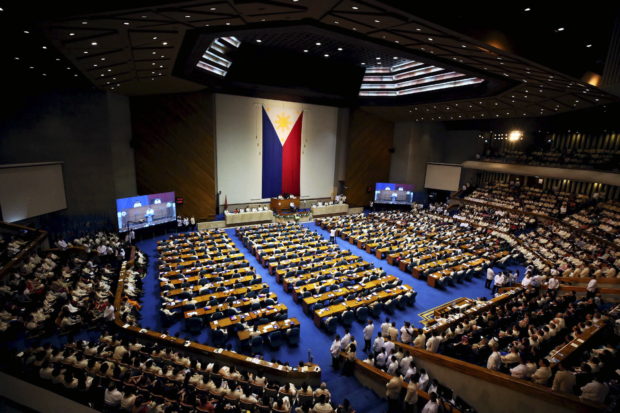
Batasang Pambansa plenary. —MALACAÑANG FILE PHOTO
MANILA, Philippines — A total of P77.5 billion was realigned by the House of Representatives to augment the allocation for the sectors of health, education, transportation, and other critical social services.
House Speaker Martin Romualdez, in a statement on Wednesday, said the following “institutional amendments” had been included in the lower chamber’s version of the 2023 General Appropriations Bill (GAB):
- P20.25 billion for several programs of the Department of Health – Medical Assistance for Indigent Patients, P13 billion; allowances for healthcare and non-healthcare workers and frontliners, P5 billion; additional funding for the Philippine
- Heart Center, Lung Center of the Philippines, National Kidney and Transplant Institute and Philippine Children’s Medical Center Health, P500 million each; 10 dialysis assistance centers throughout the Philippines, P270 million or P27 million each; Cancer Assistance Program, P250 million
- P500 million for UP Philippine General Hospital
- P10 billion for the Department of Education’s (DepEd) school building or classroom construction
- P581 million for the DepEd’s special education programs
- P10 billion for the Department of Public Works and Highways to construct water systems in underserved upland barangays
- P12.5 billion for the Department of Social Welfare and Development – Assistance to Individuals in Crisis Situations, P5 billion; Projects to upgrade senior citizens’ pension through the National Commission of Senior Citizens, P5 billion;
- Sustainable Livelihood Program, P2.5 billion
- P5.5 billion for Department of Transportation’s (DOTr) programs to address the rising cost of fuel like the fuel subsidy program, Libreng Sakay and bike lane construction
- P5 billion for the training and scholarship programs of the Technical Education and Skills Development Authority
- P5 billion for the Commission on Higher Education’s Tulong Dunong Program
- P5 billion for the livelihood and emergency employment programs of the Department of Labor and Employment
- P1.5 billion for the national broadband project of the Department of Information and Communications Technology
- P500 million for the Commission on Elections new building
- P300 million for the Philippine National Police to train law enforcement officers, which will be conducted by the
- Department of Justice and National Prosecution Service
- P250 million for the Department of Trade and Industry to assist the creative industry pursuant to Republic Act 11904
- P150 million for the Energy Regulatory Commission
- P147 million for the Office of the Solicitor General
- P50 million for the National Electrification Administration’s barangay and sitio electrification program
Meanwhile, House appropriations committee chairman Rep. Elizaldy Co, in the same statement, said they sourced the realigned funds “from agencies whose funds are unlikely to be utilized within 2023, based on historical performance or specific circumstances of their spending program.”
“Hindi madali ang desisyong ito, ngunit hindi rin makatwirang matulog ang pondo habang napakaraming pangangailangan ang milyun-milyong pamilyang Pilipino habang bumabangon ang bansa mula sa pandemya,” he added.
(This was not an easy decision, but it is also not right that our funds remain in slumber, while millions of Filipino families have so many needs that must be addressed for the country to fully recover from the pandemic.)
Co also noted that the bulk of the realignments were taken from deductions in programs and projects “whose budget may be allocated in succeeding fiscal years,” including P50 billion from the DOTr’s proposed budget for the Metro Manila Subway Project and North-South Railway Commuter for 2023.
“The idea is to allocate more budget for pro-people programs and projects without the need of imposing new taxes. One thing is sure: all major infrastructure projects will proceed as scheduled based on a timetable that is implementable for 2023,” Co further explained.
Last Wednesday, September 28, the House approved the proposed P5.268-trillion budget of the national government for 2023, fulfilling its goal of passing the GAB before Congress goes on a recess.
Before the national budget earned the House’s nod, several lawmakers, especially those from the minority, scrutinized and aired grievances about the allocations, both during the committee-level deliberations and the plenary debates.
READ: House OKs proposed P5.268-T 2023 budget on 3rd reading
But Romualdez still praised the lower chamber “for the budget’s swift passage on third reading and for acting expeditiously, yet cautiously, on the proposed amendments.”
“I’m pleased that the House-approved version of the GAB responds to the most urgent needs of Filipinos. We need to ensure that social services are sufficient for the greater good of our countrymen, especially those in dire need of basic social services to survive,” he added.